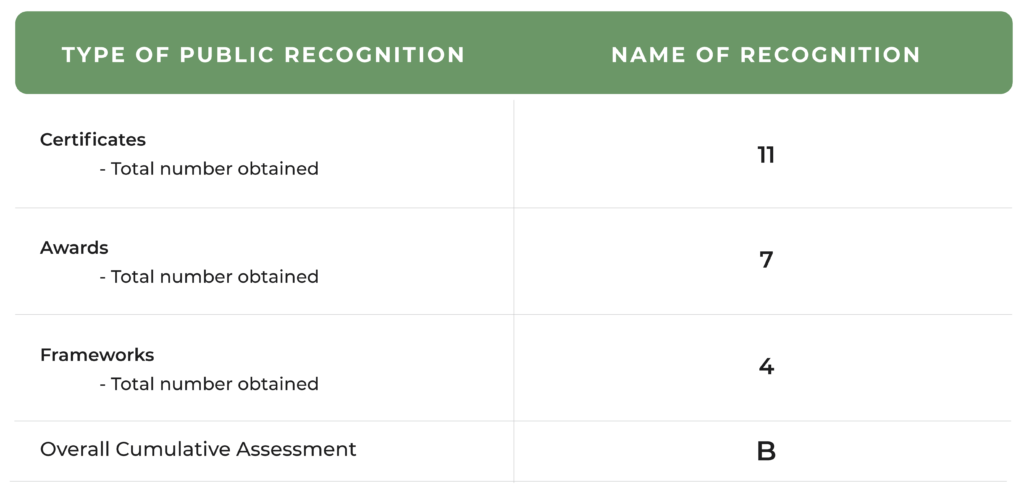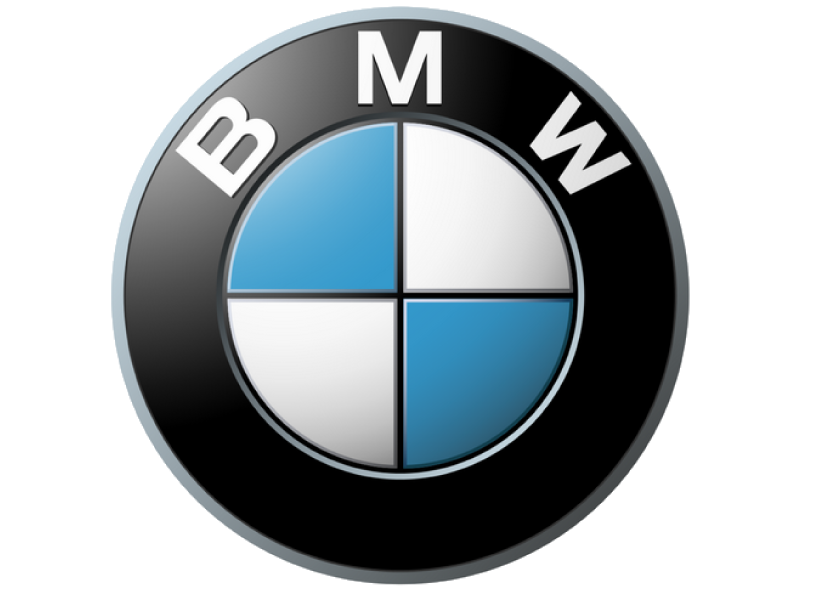
RATING

Neutral
SECTOR
Automotive
Chief Sustainability Officer
Ursula Mathar – Head the BMW Group’s Sustainability and Environmental Protection
Contact Details:
Linkedin: N/A
Stock Exchange and Ticker
FWB: BMW
Website
Contact
Tel: +49-871-702-3232 E.mail: Saskia.Graser@bmw.de
Listing
–
Awards
- World’s Most Attractive Employers 2021 as rated by Universum
- Top spot in the Trendence Professionals Barometer for Germany in 2021
- The 7th Jinxuan Awards – Annual Public Welfare Award
- 17th Corporate Social Responsibility Forum – 2021 Responsible Corporate China Newsweek
- The 8th SuQin Awards Ceremony – “Silver Award” in Social Innovation
- 2021 Golden Flag Award – CSR Gold Award
- Auto-First – China Automotive CSR Golden Key Award
- Trends Home Annual Awards – “Charity of the Year” Award 2021 Trends Home Annual Awards
- Case 36Kr – 2021 Automobile Marketing Innovation
Revenue
€111.24 billion
Market Capitalisation
€55.26 billion
Employees
118,909
Content source
BMW Sustainability Report
Evaluation of BMW
BMW group publishes the Combined Management Report that includes the Group Financial Statements, the disclosures on corporate governance and the additional GRI information. The reporting period covers the Group’s financial year from 1 January to 31 December 2021. Furthermore, the entire report of BMW AG has been audited by PricewaterhouseCoopers GmbH Wirtschaftsprüfungsgesellschaft.
BMW Group’s report on sustainability related targets and progress is comprehensive, but missing specific goals and also data to measure progress. Additionally, there is no link to the Sustainable Development Goals (SDGs). Starting with environmental goals, BMW is aiming for climate neutrality by 2050, which is 10 years later than what other automotive manufacturers are targeting. One of the reasons identified is that the Group will not be phasing out the manufacturing of vehicles with internal combustion engines, rather it will invest in technologies to reduce the fuel consumption and increase efficiency. BMW Group claims that by continuing to offer “parallel technologies” not only helps with a “smooth transition to the future of electric mobility”, but also with using the existing resources the best possible way. Regarding circularity, there are no goals specific, but rather linked to the climate neutrality by 2050, where the Group is investing in recycling and return of end-of-life vehicles, with already 2,800 return points in 30 countries; almost 30% of vehicles are manufactured from recycled and reused materials, with the goal to reach 50% through the “Secondary First” approach; and lastly the Group is missing a comprehensive strategy on battery recycling. It is hard to determine the percentage of renewable energy used, however the use of green electricity is mandatory in awarding new contracts, particularly with suppliers of energy-intensive products. Furthermore, suppliers responsible for 80% of the BMW Group’s production-relevant purchasing volume are participating in the CDP Supply Chain Programme, with a C average rating score.
Also important to note is that 28 out of 31 plants are covered by the international occupational health and safety management system, ISO 45001. Accident frequency rate dropped to 2.8 accidents per million hours worked, but not many awards related to the workplace environment or employee satisfaction besides an award from Universum as the Most Attractive Employers in Thailand.
In conclusion, BMW Group has established goals, some backed by the Science Based Targets initiative, for some progress can be measured, but others are only initiatives, and on topics such as phasing-out electric vehicles, battery sourcing and recycling, the company is falling behind compared with other automotive manufacturers. The company is rated therefore with D, with a Neutral Outlook.
Sustainability Scorecard
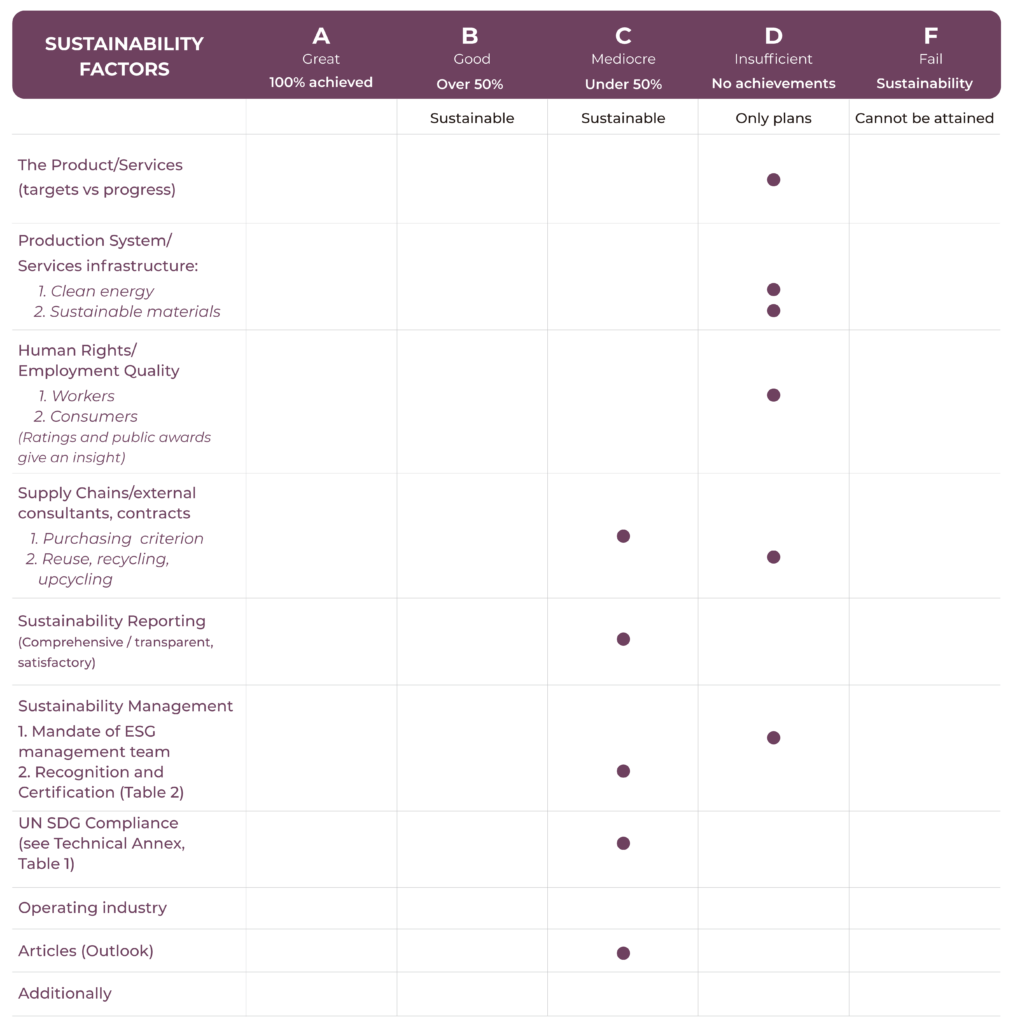
BMW Company Activity
BMW stands for Bayerische Motoren Werke AG and is a German multinational manufacturer of automobiles and motorcycles that operates through several business segments: Automotive, Motorcycles, Financial and Other Entities. The Automotive segment includes developing, manufacturing, assembling and selling of cars and off-road vehicles under the BMW, MINI and Rolls-Royce brands. The motorcycle segment has produced motorcycles since 1923 under the BMW Motorrad. Retail customers can get access to credit financing, leasing and other services through the Financial Services segment. Holding and group financing activities are the responsibility of the Other Entities segment. BMW is headquartered in Munich, Germany and was founded on March 6, 1916.
BMW Sustainability Activity - As per company declarations
The BMW Group aspires to be not only the most successful, but also the most sustainable premium car manufacturer. Setting goals such as to become climate neutral by 2050, drive additional initiatives such as CO2 emission reduction, expansion of electromobility, circularity, commitment to follow the highest environmental and social standards related to employees and the society at large. Specific CO2 emission reduction initiatives include by 2030 to reduce by 40% the CO2 emissions from its vehicles considering the entire lifecycle, from supply chain, through production to the end of use phase. BMW Group is planning on putting on the road an additional ten million fully-electric vehicles. Furthermore, circularity refers to the development of vehicles, using materials from recycling processes and components that can be fully recovered or reused.
Environmental and social standards are also extended to suppliers to comply with, along with human rights, management systems for occupational health and safety and environmental protection. Programs for career advancement, as well as health initiatives and varied diversity programs are available to all employees. And lastly, as a global player BMW Group is committed to help people and cultures around the world through the BMW Foundation Herbert Quandt. As an independent corporate corporate foundation and as a partner, The BMW Foundation Herbert Quandt promotes the UN Sustainable Development Goals as key components for grants’ allocation, collaborations and investments.
Certificate & Labels, Standards and Frameworks
- ISO 14040
- ISO 14044
- ISO 14001:2015
- ISO/IEC 27001
- ISO/IEC 27701
- ISO 45001 at 28 out of 31 plants (99.72 % of permanent employees and 98.98 % of temporary employees at BMW Group plants work at a site covered by an international occupational health and safety management system)
- MLPS 2.0 certification
- China Compulsory Certification (CCC)
- China Quality Certification Centre Material Database System
- LEED certification
- Work Safety Standardisation Level 2 Certification
- International Renewable Energy Certificates (I-RECs)
- Forest Stewardship Council (FSC)
Standards and Frameworks:
- SASB Index
- GRI
- SBTi for decarbonisation strategy
- TCFD Index
- NFS Index
BMW in the news: Press Reviews and Social Media
- The BMW Group has taken first place in the “Automobiles” category of the latest rating published by S&P Dow Jones Indices for the Dow Jones Sustainability Indices World and Europe (DJSI), earning 80 out of a possible 100 points. Available at: https://www.automotiveworld.com/news-releases/bmw-group-named-sector-leader-in-dow-jones-sustainability-indices-2020/
- BMW has announced its plans to use plastic waste from fishing nets and ropes to produce trim parts such as floor mats for some of its upcoming cars. The German luxury automaker will deploy an exclusive recycling process for waste material from the maritime industry to produce materials for exterior and interior of its BMW iX, BMW X1 and the much-awaited Neue Klasse. Available at: https://www.whichev.net/2022/09/16/bmw-to-use-recycled-fishing-nets-in-future-vehicles/
- This article criticises BMW, and the industry more general, for producing more EV’s, particularly in the SUV market, but at the cost of more luxurious materials and being bigger and heavier, therefore using up more finite resources, space and energy. Such as the BMW’s 2.6-tonne iX, the 2.7-tonne i7 and now the even heavier XM, at 2.75 tonnes officially the heaviest car it has ever made. Available at: https://www.autocar.co.uk/opinion/business-environment-and-energy/editor%E2%80%99s-letter-are-premium-brands-taking-sustainability
BMW has announced a wide range of initiatives to instil greater sustainability in the sourcing of materials for parts. They include the use of maritime waste for injection-moulded plastic parts, recycling of steel, aluminium and glass, and the recycling of battery cells. Available at: https://www.automotivelogistics.media/sustainability/bmw-targets-a-more-sustainable-sourcing-of-key-components/43445.article
Highlights from BMW Sustainability Report
Achievements
- An average of 80 % carbon reduction at production sites and locations (Scope 1 and 2) per vehicle produced
- Carbon reduction during the use phase (Scope 3 downstream) by an average of at least 50 % per kilometre driven and an average of at least 20 % carbon reduction in the supply chain (Scope 3 upstream) per vehicle produced.
- In 2021, 99.2 % of the waste generated by production processes was either recycled or recovered
- The BMW Group reduced its emissions of volatile organic compounds (VOC 3 ) per vehicle produced by 13.6 % to 0.70kg during the period under report
- Specific water consumption in production was improved slightly to 2.15 m3 (2020: 2.25 m3) per vehicle produced during the year under report
- In order to show commitment to the Paris Agreement targets, in 2021 BMW became the first German automotive manufacturer that joined that Business Ambition for 1.5°C initiative of the SBTi and also became part of the international Race to Zero campaign organised by the United Nations.
- The scale of the training initiative is reflected in the significant increase in the number of participants:
- €389 million invested in vocational and further training of BMW Group employees in 2021
- Training measures undertaken across the BMW Group in 2021 involved a total of 1.1 million participants (2020: 770,000).
- Each member of the BMW Group work- force received an average of 23.1 hours of training during the year under report (2020: 16 hours)
- €25 million spent by the BMW Group in 2021 on social projects and other activities in conjunction with its corporate citizenship responsibilities.
- The share of women in the BMW Group workforce as a whole reached 19.7 % (2020: 19.5 %)
Weaknesses and Setbacks
- BMW has not plans to phase out the production of internal combustion engines, however the company claims to take an ‘Efficient Dynamics’ approach and adopt technologies that will further reduce the fuel consumption of and increase efficiency
- BMW to increase the proportion of electrified vehicles deliveries to 30% by 2025, and by 2030, 50% of the BMW Group’s vehicle deliveries worldwide are set to be fully electric models
- 2021 was BMW’s second worst year in terms of total carbon emissions – at 122,539,929 tonnes of CO2, mainly driven by renewed growth in production volume
Targets vs Progress Reported
| Target | Results reported |
|---|---|
| Over a 40% decrease in carbon emissions on average per vehicle over its entire life cycle by 2030 compared with 2019 | |
| The BMW Group aims to deliver up to 10 million fully electrified vehicles over the next 10 years | 328,314 electrified vehicles delivered by the BMW Group in 2021 – more than twice as many as in 2019 |
| 80 % decrease in carbon emissions on average per vehicle produced by 2030 compared with 2019. | 17.5 % decrease in carbon emissions on average vehicle produced between 2019 and 2021 |
| Carbon reduction during the use phase 4 (Scope 3 down stream) by an average of at least 40% per kilometre driven. | Carbon reduction during the use phase 4 (Scope 3 down-stream) by an average of at least 50 % per kilometre Driven. - The BMW Group’s global carbon fleet emissions averaged 197.9 g CO2 / km in the year under report (2020: 212.4 g CO2 / km). The figure represents a reduction of 9.4 % compared with the 2019 baseline. - Average fleet CO2 emissions for EU totalled 115.9g CO2 / km, taking regulatory requirements into account. Significantly reducing fleet carbon emissions compared with the previous year (2020: 135 g CO2 / km). BMW was significantly below the limit of 125.8 g CO2 / km applicable. |
| Reduce carbon emissions in the supply chain by at least 20 % by 2030 (base year 2019) | - In 2021, BMW Group introduced the use of green electricity as mandatory in awarding new contracts, particularly with upstream suppliers of energy-intensive products, expected to reduce carbon emissions by over 20 million tonnes during the period from 2021 to 2030 - BMW participation in the CDP Supply Chain Programme, has been motivating its suppliers to participate since 2014, current trends showing that year-on-year supplier participation increased from 218 to 250 suppliers, covering 80 % (2020: 79 %) of the BMW Group’s production-relevant purchasing volume. - As in previous years, in 2021 the average CDP rating among the BMW Group’s participating suppliers was a score of C |
| Circularity - a strategic priority | - The battery Cell Competence Centre in Munich is dedicated to the research and development, the composition and design of the battery cell and industrial producibility - In the BMW Group’s production cycles, systematically is employed resources conservation, energy efficiency and continuously emission cuts - The availability of high-quality secondary raw materials is currently limited and in some cases insufficient to meet demand, however the BMW Group is working together with its partners to form closed material loops in the automotive industry. |
| Renewable energy - The BMW Group is committed to the use of renewable energy at all its locations | BMW Group procure electricity for their production sites and for the vast majority of their locations from renewable self-generation plants, direct supply contracts for green electricity and electricity of certified origin, however it is not specified the percentage used of renewable energy |
| By 2025, 22% of management positions at BMW Group held by women. | 18.8 % of management positions at BMW Group held by women at the end of 2021 |
| The Compliance Management System (CMS) addresses compliance topics such as fraud prevention, export control, anti-money laundering, antitrust compliance, corruption prevention and human rights as well as data privacy and technical compliance | - From the GRI report, during 2021 there were no legal proceedings concerning corrupt practices identified. - The BMW Group does not currently have any comprehensive Group-wide information on labour law sanctions imposed due to legal violations and therefore, this aspect of the indicator is not fully reported on. - Detailed data on the total number of cases in which contracts with business partners were not renewed due to violations related to corruption are not made available by the Group . |
UN SDGs Compliance Analysis
Progress made toward SDG targets
As reported by BMW
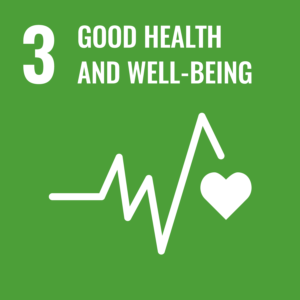
- Accident frequency rate dropped to 2.8 accidents per million hours worked from 3.2 in 2020
- 99.72 % of employees at BMW Group plants work at a site covered by an international occupational health and safety management system certified to either ISO 45001 or OHRIS level

- World’s top-ranked automotive manufacturer in the current ranking of the World’s Most Attractive Employers 2021 as rated by Universum
- 100% Share of employees in Germany, China, Austria and Mexico are represented by a trade union or falling under collective agreements
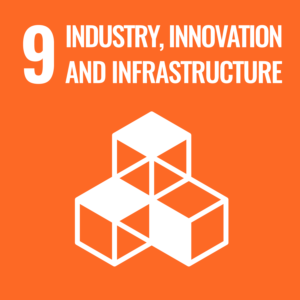
- More than 250,000 charging points available to customers in Europe with the BMW and MINI Charging Cards
- 328,314 electrified vehicles delivered by the BMW Group in 2021 – more than twice as many as in 2019

- In 2021, 99.2 % of the waste generated by production processes was either recycled or recovered
- 29% decrease in waste for disposal per vehicle produced (2019 baseline)
- Carbon reduction during the use phase 4 (Scope 3 down-stream) by an average of at least 50 % per kilometre driven
- Since 2020, we have only purchased cobalt and lithium for battery cells directly from certified mines in Australia and Morocco
- 18% decrease in solvent emissions per vehicle produced (2019 baseline)

- 17.5 % decrease in carbon emissions on average vehicle produced between 2019 and 2021
Sustainability Certificates, Awards and Listings
